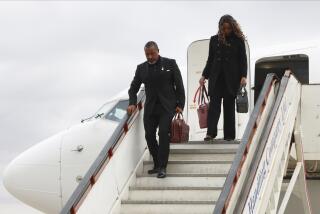Nasty Weather and Rough Terrain Add to Difficulties of Searchers in Ethiopia
- Share via
ADDIS ABABA, Ethiopia — His eyes rimmed in red, a kit bag dropped wearily at his feet, Air Force Capt. John E. Matwick was describing the rigors of searching for a twin-engine plane in some of the roughest territory and most contrary weather conditions in the world.
“With the weather so bad, the hard thing is just keeping track of where you have searched,” the 33-year-old Palos Verdes, Calif., native said at Addis Ababa airport after a 10-hour day spent searching fruitlessly for the missing plane carrying Rep. Mickey Leland (D-Tex.) and 15 others.
“The weather diverted us a lot today because the low visibility and high terrain makes it very dangerous flying.”
Matwick smiled wanly and said, “They’ve been long days.”
The largest deployment so far of U.S. and Ethiopian aircraft failed Saturday to turn up any trace of the missing plane, a two-engine Twin Otter, which vanished Monday. Leland, 44, chairman of the House Select Committee on Hunger, eight other Americans and seven Ethiopians were en route from Addis Ababa to a camp for Sudanese refugees at Fugnido, about 320 miles west of the capital near the Sudanese border.
For the first time the search was joined by four American MH-60 Blackhawk helicopters, which can better survey heavily forested areas than C-130 airplanes like Matwick’s. The MH-60 helicopters can be refueled in midair; the four craft were each refueled three times Saturday during their search.
The four copters and two C-130s are part of an armada of 18 aircraft, including 12 Ethiopian planes and helicopters, that in the last five days have scanned a 100,000-square-mile area, a region about the size of Wyoming.
Authorities said some of the Ethiopian aircraft concentrated on a triangular area between the towns of Gambela and Dembi Dolo, west of Addis Ababa and near the Sudanese border, because of reports that peasants had reported hearing a plane Monday night.
An American plane also searched an area north of the capital where a U.S. U-2 spy plane sighted a plume of smoke during an overflight Thursday. But the smoke appeared to have originated from a settlement bonfire.
As participants in the search were displaying increasing frustration and pessimism at their inability to spot the Leland plane, signs emerged that the joint U.S. and Ethiopian rescue mission might mark a watershed in what had been deteriorating relations between the two countries for 10 years.
“I can’t see how this close cooperation cannot but affect the attitudes of people, both critics and supporters, toward closeness with Ethiopia,” said Robert Houdek, charge d’affaires at the U.S. Embassy. “I’m very heartened by it.”
The Ethiopian government, American sources said, has made available all equipment, personnel and facilities requested by the United States, even to the point of rearranging its own flight schedules and airport arrangements in Addis Ababa to make room for the American air fleet.
There has been no formal arrangement so far, Houdek said, for the United States to reimburse the Ethiopians for the considerable expense of their part of the search or to provide badly needed spare parts or technical assistance to the country’s armed forces.
As it happens, the search mission comes at a time when Ethiopian President Mengistu Haile Mariam is expressing a desire for closer relations with Washington.
These relations soured during President Jimmy Carter’s Administration, when Mengistu was apparently irked at Washington’s refusal to provide better military assistance during his desert war with neighboring Somalia.
In the intervening years, Ethiopia became the closest thing in Africa to a client state of the Soviet Union, whose willingness to provide the help that the United States refused is reflected in a monumental statue of Lenin that dominates one of Addis Ababa’s most striking downtown boulevards.
Soviet Aid Dries Up
More recently, however, the Soviets have been resisting Mengistu’s pleas for more military aid, which has been drained away in the government’s long and inconclusive war with rebels in the northern provinces of Eritrea and Tigre.
Meanwhile, American officials here Saturday again rejected earlier complaints--from Leland’s Washington staff and two congressional colleagues who arrived here Friday--that the U.S. response to the congressman’s disappearance had been tardy and inadequate.
Col. Joseph De Minico, a commander of search operations who arrived here Saturday to take over management of the mission, called the deployment of American men and equipment “unprecedented.”
“To move in this many military assets in this short a time is just extraordinary,” he said. “I think what we’re doing here is just right.”
More to Read
Sign up for Essential California
The most important California stories and recommendations in your inbox every morning.
You may occasionally receive promotional content from the Los Angeles Times.










